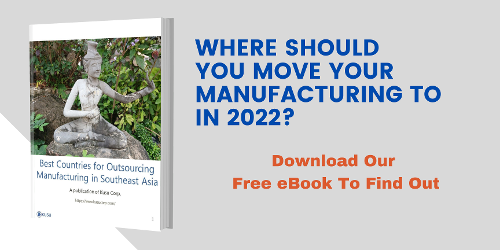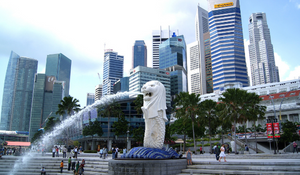As the old adage goes “It is better to deal with God than with his saints”. All too often I have...
What To Watch Out For In Southeast Asia In 2022
Southeast Asia is an incredibly dynamic region. New economic and political developments can often occur in rapid succession. And 2022 looks to be no different, with several major political shifts underway.
It is critical to keep track of all these developments and understand how they may affect your company. In doing so, we hope you can get a better understanding of the political risks associated with Southeast Asia.
Philippines’ Upcoming Presidential Election
The Philippines will be having a presidential election in May, 2022. Ferdinand Marcos Jr., son of the former Philippine dictator, will be running as President with Sara Duterte, the daughter of President Duterte, as Vice-President. According to Reuters, Marcos currently has a 20-point lead in the polls.
Many analysts worry that Sara Duterte’s candidacy bodes poorly for the Philippines democratic institution. They worry should Sara win the election, she could serve as a means to shield her father from the ongoing International Criminal Court investigation on his violent anti-drug war and the potential crimes against humanity perpetrated, writes Al-Jazeera. Their closest rival, Leni Robredo, stands in stark contrast to the Marcos Jr.-Duterte pair.
Robredo, a liberal progressive, is the current Vice-President and a harsh critic of President Duterte. “[She] has repeatedly sparred [with Duterte] over human rights, the handling of the pandemic and Duterte's close ties with China.” She is the antithesis to the Philippines’ dynastic brand of politics, states NPR. However, she currently trails Marcos Jr.’s 40% at 20% in the polls.
Myanmar’s Post-Coup Crisis
In response to the 1st of February, 2020 coup, ASEAN has implemented a five-point consensus. According to the University of Melbourne, points include: “an immediate cessation of violence in Myanmar, constructive dialogue among all parties, the appointment of a special ASEAN envoy to facilitate dialogue, the provision of humanitarian assistance, and a visit by the envoy to Myanmar.”
ASEAN efforts in the past year to release the ousted civilian leader Aung San Suu Kyi, who was arrested for alleged COVID-19 restriction violations, voter fraud, and corruption, have been unsuccessful, according to France 24, a Myanmar Junta Court will deliver a verdict on the Suu Kyi case, which could see the leader jailed for decades.
It remains unclear how successful Cambodia’s Prime Minister Hun Sen, ASEAN’s Chairman for the year, will be in mediating the Myanmar political and humanitarian crisis. This is especially considering he himself is a military dictator and has held power for forty years. Al-Jazeera reports the Premier has even held an official state visit, an act many view as legitimizing the military junta.
As it stands, according to Al-Jazeera, since the coup, nearly 1,500 people have been killed and 11,500 arrested. In response, the ruling military junta has recently come to an agreement with all the ethnic armed organizations in the country to extend the ceasefire that was supposed to expire at the end of February, writes France 24.
Thailand’s Pro-Democracy Movement
“While large-scale political rallies [in Thailand] last year called for an end to government corruption and the reform of the monarchy, this year’s protests have taken on a harder edge and reflect much wider public discontent over the failure to contain the coronavirus,” writes the Telegraph.
Evidently, the fizzling pro-democracy protests, which initially began in 2020, have seen a resurgence. Since protests started, according to the Guardian, 1,636 protestors have been arrested. 150 are to be jailed for offending the monarchy, an offence which can lead to fifteen years in prison.
The Telegraph adds that Prime Minister Prayuth Chan-o-cha, the former Commander-in-Chief of the Army who took control of the country after a 2014 coup, has recently faced a vote of no-confidence. This is the second no-confidence vote of the year, the third since the 2019 general election. The vote was held over dissatisfaction over government handling of the COVID-19 pandemic.
Malaysia’s Volatile Government
“For nearly half a century, Malaysia’s political dynamics were demarcated by a stable hybrid regime, an amalgam of democratic procedures, electoral manipulations, and repressive controls. This regime was anchored in the single-party dominance of the United Malays National Organization (UMNO),” states the East Asia Forum.
This is in stark contrast to the current state of Malaysian politics. The UMNO was ousted from power for the first time in 2018 by Pakatan Harapan (The Alliance of Hope). Pakatan would then be ousted from power after only twenty-two months. A quick succession of Prime Ministers and the UMNO’s return to power followed.
According to the Economist, protests broke out thereafter in 2020 over the handling of the COVID-19 pandemic. Afterwards, then-Prime Minister Muhyiddin Yassin resigned, having only been in power for eighteen months, the shortest Premiership in Malaysian history. Things have somewhat stabilized but it is still unclear how the government would handle the current flood crisis, which has already displaced 60,000 people according to NBC News.
Conclusion
The aforementioned political developments are certainly worthy of attention and worthy of monitoring. In discussing these topics, we hope you would be able to make a more informed decision should you wish to expand production to Southeast Asia.
Should you wish to keep up to date with political developments that may affect your company then do follow Kusu Corp’s newsletter and its blog. We here at Kusu continue to monitor any and all political developments to offer you and your company a more comprehensive understanding of Southeast Asia.
-1.jpg?width=146&height=50&name=Kusu%20(1)-1.jpg)




